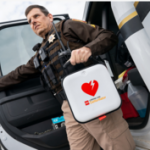$10.1 million grant from Helmsley Charitable Trust provides Iowa law enforcement officers and first responders with more than 4,000 AEDs
February 17th, 2021 by Ric Hanson
The Leona M. and Harry B. Helmsley Charitable Trust has awarded the Iowa Department of Public Health (IDPH) Bureau of Emergency and Trauma Services (BETS) a $10.1 million grant to provide law enforcement officials and first responders throughout the state with more than 4,000 automatic external defibrillators (AEDs) to improve cardiac arrest survival. The three-year project aims to equip every law enforcement vehicle in the state with an AED and train law enforcement professionals to deliver the best care prior to the arrival of Emergency Medical Services (EMS). Additionally, the project will equip conservation officers and staff at state parks with AEDs.
 Studies conducted by the American Heart Association demonstrate a dramatically higher survival rate for cardiac patients defibrillated by law enforcement, who are generally first on the scene, especially in rural areas. “On behalf of law enforcement officers and first responders across Iowa, I want to thank the Helmsley Charitable Trust for their commitment to saving lives,” said Iowa Department of Public Safety Commissioner Stephan Bayens. “When tragedy strikes, officers respond. This donation will put a defibrillator in up to 4,000 patrol cars and will equip officers with the ability to provide immediate and effective lifesaving efforts. There is no doubt lives will be saved and families transformed as a result of this generosity.”
Studies conducted by the American Heart Association demonstrate a dramatically higher survival rate for cardiac patients defibrillated by law enforcement, who are generally first on the scene, especially in rural areas. “On behalf of law enforcement officers and first responders across Iowa, I want to thank the Helmsley Charitable Trust for their commitment to saving lives,” said Iowa Department of Public Safety Commissioner Stephan Bayens. “When tragedy strikes, officers respond. This donation will put a defibrillator in up to 4,000 patrol cars and will equip officers with the ability to provide immediate and effective lifesaving efforts. There is no doubt lives will be saved and families transformed as a result of this generosity.”
During the first year of the grant, BETS will distribute LIFEPAK® CR2 defibrillators designed by Stryker to all participating law enforcement agencies for primary response vehicles. Master trainers throughout Iowa will teach and refresh CPR and AED skills, and agencies and training academies are invited to check out training devices for continued refresher training. Communication regarding the training requirements and device distribution will be sent through the ILEA contact lists and through the IDPH/BETS local public health, hospital and EMS coalitions.
The extreme time sensitivity of cardiac arrest makes it imperative that all responders within the out-of-hospital “Chain of Survival”[1] have the tools, technology, and training to maximize the chance of survival and recovery for victims of cardiac arrest. The six links in chain, according to the American Heart Association, are:
Recognition of cardiac arrest and activation of the emergency response system
Early cardiopulmonary resuscitation (CPR) with an emphasis on chest compressions
Rapid defibrillation
Basic and advanced emergency medical services
Advanced life support and post-cardiac arrest care
Recovery (including additional treatment, observation, rehabilitation, and psychological support)
The staff at BETS is committed to working with law enforcement agencies to assure the first three steps of the chain are maximized.





